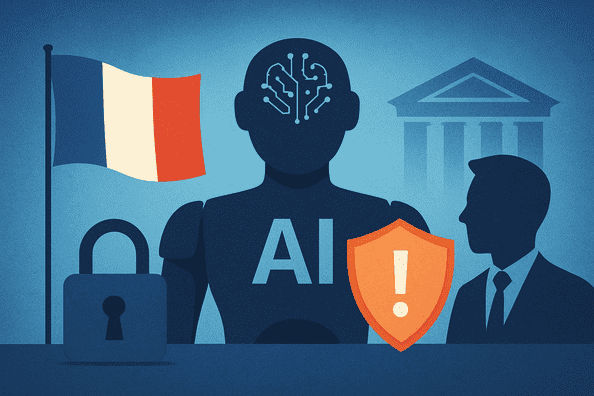France has emerged as a trailblazer in crafting robust frameworks to address the growing landscape of AI threats in France. Privacy breaches, algorithmic bias, disinformation campaigns, cybersecurity risks, and national security concerns require a balanced approach that safeguards citizens while fostering innovation. This post unpacks France’s evolving strategy, highlighting real-world cases, balanced viewpoints, and insights for businesses and citizens navigating this complex terrain.
Understanding the Landscape of AI Threats in France
Artificial intelligence promises transformative benefits across industries, but it also introduces significant risks. In France, privacy erosion has become a pressing issue as facial recognition and mass data collection tools proliferate. Citizens and advocacy groups have raised alarms about how personal information is gathered and used without sufficient transparency. Algorithmic bias presents another major challenge: discriminatory outcomes in hiring, lending, and even law enforcement can exacerbate social inequalities and erode public trust.
Deepfake technology and automated disinformation campaigns pose threats to democratic processes and media integrity. Sophisticated AI-driven hacking tools have raised the bar for cybersecurity defenders, enabling more potent and stealthy attacks on critical infrastructure. Finally, the potential deployment of autonomous weapons or AI-driven surveillance systems raises national security concerns that demand strategic oversight.
France’s National AI Strategy and Risk Framework
Launched in 2018, France’s national AI strategy—“AI for Humanity”—initially focused on promoting R&D and positioning the country as a global AI leader. However, by 2021 the strategy evolved to explicitly address AI threats in France. The government established the Conseil national de l’intelligence artificielle (CNIA) to advise on risk management and ethical questions. High-risk AI systems, such as biometric identification tools and applications in critical infrastructure, must now undergo pre-market assessments under the CNIA’s guidance. Cross-ministerial task forces coordinate efforts between defense, digital security, and civil authorities to ensure a unified response to emerging AI dangers.
This layered framework illustrates France’s commitment to a holistic approach: innovation incentives sit alongside rigorous oversight at every stage of AI deployment.
GDPR and Beyond: Data Protection Measures
France enforces the European Union’s General Data Protection Regulation (GDPR), one of the world’s most stringent data privacy regimes. Under GDPR, organizations must practice data minimization and clearly define the purpose of data processing activities. Individuals have the right to transparent explanations of algorithmic decisions, and data controllers are obliged to respond to requests for such explanations.
The CNIL (Commission nationale de l’informatique et des libertés) plays a pivotal enforcement role, wielding the power to impose fines up to €20 million or 4 percent of a company’s global turnover. In 2023, the CNIL fined a major adtech firm €35 million for opaque AI profiling practices, underscoring the importance of transparent algorithmic governance.
EU AI Act: France’s Role in Shaping Pan-European Rules
France has been a proactive driver of the EU AI Act, a landmark regulation that classifies AI systems by risk level. Under this framework, “unacceptable” applications—such as social scoring by governments—are outright banned. High-risk systems like biometric ID tools and critical infrastructure controls face strict requirements, including mandatory risk assessments and human oversight. Limited-risk applications, such as chatbots and recommendation engines, must adhere to transparency obligations so users are aware they are interacting with AI. Minimal-risk systems, like spam filters or video games, have no special requirements.
| Risk Category | Description | Examples |
|---|---|---|
| Unacceptable | Poses clear threats to fundamental rights | Social scoring by governments |
| High | Critical applications requiring strict controls | Biometric ID, critical infrastructure |
| Limited | Transparency obligations | Chatbots and recommendation engines |
| Minimal | Little to no risk | Spam filters, video games |
Experts from the CNIA contributed analyses on biometric surveillance and law enforcement use cases, helping to shape the Act’s stricter provisions for high-risk AI systems.
Ethical Oversight and Public Consultation
France complements its legal frameworks with strong ethical oversight and civic engagement. The Haute Autorité de Santé (HAS) reviews AI applications in healthcare to prevent biased diagnostics and ensure patient safety. The Office parlementaire d’évaluation des choix scientifiques et technologiques (OPECST) publishes in-depth reports on AI sovereignty and security, guiding parliamentary debate.
Public consultations also play a key role. In 2024, a nationwide consultation on automated decision-making in social services garnered over 5 000 submissions from citizens, NGOs, and industry stakeholders. These contributions shaped final policy drafts, ensuring diverse perspectives informed the regulatory outcome.
Balancing Innovation with Safeguards
Critics argue that stringent rules may hamper startups, but France maintains that clear guidelines foster market confidence. The AI Regulatory Sandbox allows emerging companies to test high-risk AI applications under CNIL supervision before full commercial launch. The France 2030 Fund allocates €1.5 billion to AI projects that meet ethical and security criteria, linking financial support directly to regulatory compliance. Digital Sovereignty Partnerships with European peers promote open-source AI toolkits adhering to high standards, reducing dependence on non-EU technologies.
By aligning funding, market access, and oversight, France incentivizes responsible innovation while curbing AI threats in France.
Case Study: Combatting Deepfake Disinformation
Late 2024 saw deepfake videos targeting municipal election campaigns in Marseille. France responded swiftly by mandating that platforms flag manipulated media within 24 hours and developing forensic AI tools at the Laboratoire national de métrologie et d’essais (LNE) to detect synthetic content. Legal amendments to the electoral code now empower courts to halt smear campaigns driven by AI-generated forgeries. This coordinated approach demonstrates France’s ability to adapt its regulatory ecosystem to emerging AI threats in France.
Corporate Responsibility and Industry Codes of Conduct
French tech companies and SMEs are forging voluntary codes to preempt stricter mandates. La French Tech’s Ethical Charter commits members to fair data practices and routine bias audits. Banque de France issued guidelines for AI fairness in credit scoring, emphasizing transparency and auditability. Media organizations have formed a pact pledging to label generative-AI content and uphold journalistic standards. These self-regulatory measures foster a culture of accountability and partnership with policymakers.
Research, Education, and Workforce Development
Mitigating AI threats in France requires building talent and expertise. Universities now include mandatory AI ethics modules in engineering and business programs. Research grants from CNRS and INRIA support projects on safety, interpretability, and adversarial robustness. Public workshops, such as the “AI for Citizens” roadshows, demystify automated decision-making for non-technical audiences. By investing in literacy and talent development, France equips future developers and leaders with the knowledge to embed ethical practices from day one.
Navigating Challenges and Future Directions
Despite significant progress, challenges remain. Coordinating AI regulation globally is complex, and France must align its frameworks with counterparts in the US, UK, and beyond. The rapid pace of AI innovation risks outstripping legislation, suggesting a need for adaptive “living regulations” that evolve alongside technology. Finally, measuring regulatory impact requires robust metrics and ongoing evaluation to ensure policies effectively mitigate AI risks.
Looking ahead, France is exploring mandatory AI audit trails, security certification for high-risk systems, and international treaties on autonomous weapon systems. These initiatives will shape the next phase of AI governance and determine how effectively society can balance innovation with safety.
Conclusion
France’s comprehensive strategy to regulate AI threats in France blends stringent legal guardrails, ethical oversight, and collaborative innovation. By weaving together GDPR enforcement, the EU AI Act, public engagement, and industry partnerships, France offers a model for safeguarding fundamental rights without stifling technological progress. Businesses and citizens alike must stay informed of evolving rules and embrace transparent, fair AI practices to thrive in this new era.



